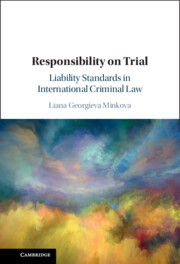Book contents
- Responsibility on Trial
- Responsibility on Trial
- Copyright page
- Dedication
- Contents
- Acknowledgements
- Abbreviations
- 1 Introduction
- 2 The International Legal Field
- 3 The International Criminal Justice Field from Within
- 4 Before Rome
- 5 Drafting the Rome Statute
- 6 Interpreting the Rome Statute
- 7 An Overview of ICC Cases
- 8 The Road to Acquittals
- 9 The Road to Convictions
- 10 Concluding Remarks
- Bibliography
- Index
4 - Before Rome
Common Law Influence and the Merging of Morality and Legality
Published online by Cambridge University Press: 09 February 2023
- Responsibility on Trial
- Responsibility on Trial
- Copyright page
- Dedication
- Contents
- Acknowledgements
- Abbreviations
- 1 Introduction
- 2 The International Legal Field
- 3 The International Criminal Justice Field from Within
- 4 Before Rome
- 5 Drafting the Rome Statute
- 6 Interpreting the Rome Statute
- 7 An Overview of ICC Cases
- 8 The Road to Acquittals
- 9 The Road to Convictions
- 10 Concluding Remarks
- Bibliography
- Index
Summary
Chapter 4 argues that the nascent community of international criminal law practice coalesced around the judgments issued by the International Military Tribunal (IMT) in Nuremberg and International Military Tribunal for the Far East (IMTFE) in Tokyo after the end of the Second World War. The United Nations (UN) tribunals for the Former Yugoslavia (ICTY) and Rwanda (ICTR), established in the 1990s, significantly developed the legal rules regulating the attribution of individual criminal responsibility for mass atrocities, further consolidating the international criminal justice field. Chapter 4 argues that, from the perspective of intersubjective legalism, both the post-Second World War tribunals and the UN tribunals displayed sound legal reasoning in the assessment of criminal responsibility for two reasons: Firstly, they followed a consistent normative logic, namely that morality was the animating force behind legality. Secondly, many judges and outside legal commentators shared that normative logic. Nevertheless, over time the UN tribunals polarized the international criminal justice community of practice on questions concerning the scope and requirements of criminal responsibility rules.
Keywords
Information
- Type
- Chapter
- Information
- Responsibility on TrialLiability Standards in International Criminal Law, pp. 91 - 119Publisher: Cambridge University PressPrint publication year: 2023
